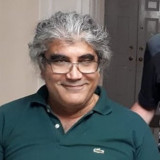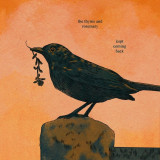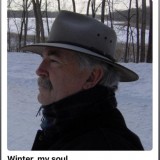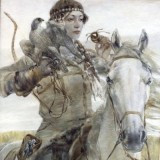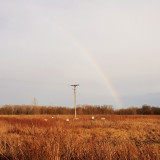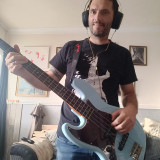Your 'Voice'
-
D.
5 years agoWhen I was in university, our lecturers constantly drummed the importance of having a voice in your work - something recognisable - for your audience and readers to form more of an attachment to your writing. I'll take one of my favourite writers, Neruda: even his translated works have the most distinctive voice, that is, you know from the first few lines you are reading a Neruda poem. You could rephrase 'voice' as 'style', but I feel writing style is a little more vague and generic. I'm talking about many factors: tone, personality, use of language, metaphor, how you shape the world in your writing. Every person has a voice, but is it consistently prevalent in your writing? It is something many writers spend years working on. Some writers' voices are automatically shaped by their surroundings. Some of you here may never have considered it. Maybe that's a good thing!
There are actually many writers on this website that I would say have a stronger 'voice' than others. This is not to say that they are better poets, but as somebody who was always criticised by his teachers for not having a consistent tone or voice in their poetry, I want to pose a few questions for you to ponder! I will purposefully leave out my opinion for now, as it's out of curiosity more than anything:
Do you consider your poetry to have a consistent voice?
Is it something you've ever consciously wondered about? Or even tried to apply?
Who are your favourite poets? What is their voice? Why are you drawn to them?
If a poet's voice and identity differs in each poem, what do you think may be the reason for that?
Just a bit of Sunday thinking for you all. Hope everyone and their families are well. :) -
Hellon replied to D.
5 years ago, updated 5 years agoVery good topic Danny...and, I hope you will have a lot of responses to it as it's very interesting to hear what others think.
Do you consider your poetry to have a consistent voice?
No...next answer explains why.
Is it something you've ever consciously wondered about? Or even tried to apply?
Never really thought about it. I think my writing has had many varied topics over the years so it would be hard for me to say for sure. I've never, nor would I trying to apply a voice...I think I would loose my thoughts if I did. Most of my work is written within a 10 minute window...good or bad it's how it works for me and, I never normally visit the poem after I post it.
Who are your favourite poets? What is their voice? Why are you drawn to them?
I like slam poetry because I find it similar to rap. Rappers make it sound easy but...it's not. Omar Musa is one of my favourite slam poets.
If a poet's voice and identity differs in each poem, what do you think may be the reason for that?
Depends on their upbringing I guess. I'm not sure if you are familiar with Lemn Sissay? He has an amazing story to tell about his life and he's also an amazing poet...look him up.
I've enjoyed your little survey Danny and may come back to add some more. I will definitely be interested to read other members input and...your's of course.
Just a bit of Sunday thinking for you all. Hope everyone and their families are well. :)
-
Star replied to D.
5 years agoThis is actually very intriguing discussion. I grew up studying English as a second language from a very young age, composition (as it was called before now it’s just writing lol ) was always my favorite part of English class. I was creative I had all those pictures in my head that I wanted to draw but I am really bad at drawing. So many times what I wrote doesnt make sense. I find my way to poetry one day, and I just loved it enjoyed it. I was conscious of my writing personality and voice, because it was pointed out not in the best way lol. So I wanted to have one or at least show one. I think Im still finding my voice, but I know what I want it to be like.
Also I believe the voice we want in our poetry isnt always delivered the way it is intended to. And it differs from one reader to another. -
Saerelune replied to D.
5 years ago, updated 5 years agoLove these questions! My "voice" has definitely changed a lot over the years I've been here. I do think that if names were removed from a few poems on this website, some authors can be easily picked out. Off the top of my head: Noura, Mark, Myryn, Jane, both Melissa's, Colm, Abby, Yakari, all have very distinct styles... But this might also be because I've just read a lot of their work over the years. Some poets may belong to "clusters" for their similar styles... I'm not sure if I have identified anyone with my type of poetry yet (not to say I am unique per se, I find my style has become very simple and therefore a bit generic over the years).
Do you consider your poetry to have a consistent voice?
Depends on my mood. I think I generally try to be raw but play with melodies through repetition or alliteration/assonance, which makes my poems feel like similar rhythms. I would say I try to pull together both classic imagery (moon, sea, sky, etc) with what I call a more industrial/urban edge (using tin cans, bikes, or more gory stuff such). But this often happens naturally. I find that especially when I am overly emotional I just tend to throw most thinking out of the window. My voice depends on how cryptic I want the poem to be I guess (i.e. how honest I feel I can be).
Is it something you've ever consciously wondered about? Or even tried to apply?
I think I just try to be honest to my character, experience and emotion I am trying to portray. In that sense, you could say it's a conscious effort, but maybe also not because it's very much dependent on my emotions.
Is it something you've ever consciously wondered about? Or even tried to apply?
It's been a while since I read poetry... I remember a few by Maria Rainer Rilke, Neruda... but also contemporary ones such as Jeanann Verlee and Warsan Shire. I like poets that use unique and strong imagery... those who bring strong paintings to live with simple words.
If a poet's voice and identity differs in each poem, what do you think may be the reason for that?
Growth, the subject that's described, mood. After all, poetry is an expression of ourselves and I don't believe any of us are always the same every second, let alone throughout the years. -
Sunshine replied to D.
5 years ago, updated 5 years agoReally nice thread Danny!
I don't know, I write because I do not speak. So does that mean I have a voice in my poems ? I do not know, readers, if there are any, might have to judge. My poems are written in few minutes too, I edit a little if I felt I could have expressed myself better by saying that instead of this. But I do not think of it no, I just believe that there might be an identity for my poems because ever since I started..I been writing because of the same source of inspiration.....well mostly. I do not post my poems under a certain category, I can't tell if it's a love poem, lost relationship poem, sad poem, nature poem..I don't know, my poems are the delivery of my instant emotional state. A release of images in my head, I have a very sharp imagination and if I do not write sometimes I might just not be able to focus. So I literally write what's in my head, on my mind, rather than use my head to write.
I do not think I can write when I am in a neutral state. Maybe I can deploy that at my job or some freelance work that needs creativity but not in a poem. -
-
Larry Chamberlin replied to D.
5 years agoWonderful thread, Daniel, and thought provoking!
#Do you consider your poetry to have a consistent voice?
For the most part, yes, unless I am speaking from another’s point of view.
#Is it something you've ever consciously wondered about? Or even tried to apply?
Not so much deliberate as just speaking my own mind.
#Who are your favourite poets? What is their voice?
The two that most influenced me were T S Elliot & Bob Dylan. To me, Elliot’s Hollow Men and Dylan’s It’s Alright Ma share a common voice, that of protest and a call to rise above the idiocy of social constrictions.
#Why are you drawn to them?
Their ability to send a full range of messages from the profound to the silly.
#If a poet's voice and identity differs in each poem, what do you think may be the reason for that?
If a writer is true to his/her art They must change. Their voice will grow as the writer does. -
D.
5 years ago, updated 5 years agoWow, some really interesting thoughts and responses! I think you all perceive 'voice' slightly differently, and that means for some wonderfully varied answers. I would love for more to share their opinion, however brief!
Hellon - I would honestly say that you have a very distinctive voice, one of the most recognisable on this website, even if you may not think so. Your constant use of ellipsis is actually one of the key parts of that for example. Minor things such as punctuation and form can often say a lot about a poet. There's a poet who recently joined Poems-and-quotes that doesn't capitalise anything or use much punctuation at all. This is a contributing factor! Regarding topics, in my opinion, they do not wholly define a voice, it's how you approach these topics, your worldly view, style and tone are factors which contribute to this more immensely. Never heard of Lemn Sissay - I'll definitely look him up! I would also love to see you attempt some beat poetry yourself Hellon! Try it!
Star - I didn't know English was your second language! When people are fluent in another language, their voice often carries through, though the difficulty is dependent on the language I'd say. That's the most fascinating part - it does change from reader to reader, but a strong voice would resonate in the same way a novelist, or artist, or musician, or director's would. Poetry is a little more difficult as we're providing only snapshots, but it's pretty much the same principle. Do you agree? Or are poets different?
Saerelune - Great answers! You went in deep! :) Alliteration and assonance are excellent for establishing voices. Are these writing techniques essential to your writing? Do you always try to employ them? Does your poetry feel naked when you don't? Some poets always rhyme. Is this is an integral part of their voice? I would ask the strict rhymers and non rhymers for their opinion on this too. Saerelune, it seems you have great self awareness when it comes to your writing. Do you pre-meditate these themes, symbols, and types of imagery before you write or do they come naturally as it is something now integral in your writing?
'I like poets that use unique and strong imagery... those who bring strong paintings to live with simple words.' Me too!
Larry - We all change throughout the years, but do you not think that writers with a distinctive, strong voice often do not change at all, but merely become better poets? Their voices do not change but become stronger? How different is how you write now to 20 years ago? (If you still wrote)? Would you recognise yourself?
Rania - I loved your answer. So your writing is almost an instantaneous reaction to emotion? Do you not think that poets so in touch, and responsive to their emotions actually have stronger voices, as they are almost not planning anything? -
silvershoes
5 years ago, updated 5 years agoDo you consider your poetry to have a consistent voice?
Sadly, no, I don't think I've managed to develop a consistent voice.
Edit: Saerelune, thank you for thinking otherwise :)
Is it something you've ever consciously wondered about? Or even tried to apply?
Yes, I do try to have a voice. I try to carry myself with me into my writing and tell people who I am in one way or another, even if it's a fantastical story or poem where I'm not the real protagonist. I find myself inspired most by the same forces when I write -- bodies of water, mostly, which is something that dear Andrea once pointed out and it's stuck with me always. I think I'm a water child and I connect my feelings with movements of the water and types of water bodies. Also, other elements like earth and fire, and the celestial. I write mostly when I'm in my grief or feeling heartache, which is common for me. My dad has often said that I feel things more strongly than most people. I feel very sad a lot of the time.
Who are your favourite poets? What is their voice? Why are you drawn to them?
I find inspiration from songwriters more often than not. As for poets -- strictly poets -- my favorites are on this site. I think having a personal connection with the poet enhances their poetry. I don't want to try to list my favorite poets on this site because there are too many and I wouldn't want to risk missing someone.
If a poet's voice and identity differs in each poem, what do you think may be the reason for that?
My immediate thought is empathy. Being able to relate with others and feel what others feel allows a writer to have different voices. Also, we're complex beings and I think we're ever-changing, transforming moment to moment, day by day, year by year, sometimes reconnecting with ourselves over and over again; sometimes just changing small parts of ourselves while certain threads stay true, lasting longer than others, sometimes forever, weaving around the little changes. -
Larry Chamberlin replied to D.
5 years agoDaniel,
I think the difficulty lies in defining terms. What you have described as "voice" now sounds more like style than what I took as the meaning of voice. Use of grammar, syntax and structure to me is more in line with the style of writing which may persist over a lifetime. Hemingway, for instance and his short declaratory sentences. My use of the term voice is from the belief it represents an inner motivation or purpose for communicating. For instance, Dylan was the "voice" of his generation in his songs of protest and anti-establishment songs. As he grew older his songs have aimed more at the experiences common to most people and a quiet appreciation of life. -
Star replied to D.
5 years ago, updated 5 years ago“ I didn't know English was your second language“
Well I guess thats a good thing, I always thought it shows in my writing. The thing is I only write in English lol I find it easier!
“ That's the most fascinating part - it does change from reader to reader, but a strong voice would resonate in the same way a novelist, or artist, or musician, or director's would.”
I do agree with this, actually the only difference is preferences.
As with poetry I do think its a little different. Emotional state while reading plays a role in interpreting the voice (or even the attitude of the poet) and not the meaning, like when you’re in a good mood and listening to a sad love song. Thats the case only if you’re not familiar with the poet, and reading his/her work for the first time.
EDIT:! Use of grammar, syntax and structure may support a voice, but it isnt how I would define a voice. So I also agree with Larry’s post -
Poet on the Piano
5 years agoThis is such a fascinating thread and I love hearing everyone's responses and interpretations!
To me, finding one's own voice in poetry stems from an emotional connection with words. I feel like I didn't have a voice when I used to write because I solely focused on providing more imagery and provoking a thought. I basically forced a poem into existence instead of being influenced BY it. I didn't yet feel the "need" and "desperation/yearning" to write what I had been through.... until I was 18 or 19. I've noticed I use "I" in an overwhelming amount of my recent poems. Sometimes I try to rein that in but first person narration has helped me have affirmation or at least be able to release parts of me in an honest, raw light.
I don't think a poet's voice can necessarily be pointed out or described in a direct fashion. I see it as abstract, not only showing progress where the poet discovers their reason for writing, but also conveying that it an authentic way to the reader. Style has always seemed more technical to me, using devices in language to specifically help bring out a message in unique ways. -
Saerelune replied to D.
5 years ago@Daniel:
# "Are these writing techniques essential to your writing? Do you always try to employ them? Does your poetry feel naked when you don't? Some poets always rhyme. Is this is an integral part of their voice?"
I don't think I always try to employ them it's just the way my mind works. I originally got into poetry when I was 11 years old and struggled to express my emotions... My preferred medium of expression would be drawing but since I didn't have the skill for it, I started writing poetry. :) Also, some of my favourite musicians back then inspired me with the magic of English. The words and sounds and sentences just sounded so much more beautiful and expressive than the Dutch language that I grew up with. Hence, I think in terms of sounds and images whilst writing. Especially now that my poems are very straightforward and simplistic in language, I would say they would feel naked without a few playful sounds in them.
# "Saerelune, it seems you have great self awareness when it comes to your writing. Do you pre-meditate these themes, symbols, and types of imagery before you write or do they come naturally as it is something now integral in your writing?"
I think I used to pre-meditate all those things when I first joined this site back in 2009. Some people might remember my past poems as very cryptic, heavy with symbolism, with lots of difficult words. I was also still learning English so I think I just very much enjoyed throwing in all the new words I found in dictionaries haha. As I have gotten used to thinking in English, I find that words just flow naturally. Most of my poems these days are written within minutes and are very raw, whereas I would take an hour before, thinking about mythological symbols and such. I do spend a fair amount of time just re-reading the poems and editing them a bit afterwards, but usually just a semi-colon here and maybe shaving off some words there... The emotions and expressions generally stay the same because they capture my emotions and I don't want to change that memory. I rather just recycle bits into a new poems if I feel like a new stance must be taken. For example, I think this is how one of my poems came to be as a mash-up of older poems: https://www.poems-and-quotes.com/poems/1274675
I have definitely learnt to be more accepting of myself, daring to be vulnerable, which has heavily influenced my latest style.
-
Darren
5 years ago
Do you consider your poetry to have a consistent voice?
No definitely not, unless rambling is a voice. Like Hellon I write quick and once only usually.
Is it something you've ever consciously wondered about? Or even tried to apply?
Funnily enough not in poetry, I have in painting. A lot of my portraits are done in a very similar style.
Who are your favourite poets? What is their voice? Why are you drawn to them?
Ted Hughes, his voice is very melancholic to my ear. I studied him at A level and just kept going, his work resonated with me for some reason
If a poet's voice and identity differs in each poem, what do you think may be the reason for that?
I think their own Education and life experiences are creeping through their work. -
D.
5 years agoJane - I would be inclined to agree with Saerelune too. :) it's interesting you mentioned water - I'm also incredibly inspired by bodies of water. I'm currently living in Riyadh, and whilst it's an incredible city, I miss being near a river, or sea. I couldn't be much further away ahah.
I would say many poets probably have their strongest urge to write when they are suffering. In which case, perhaps the poet's voice is at its most natural state, and produces poetry that readers can often find themselves in, connect with (as you said). It's an interesting point about connection...I still feel connected to many poets on this website, even though I disappeared for about 6 years, I was delighted that some were still here!
Larry, Star, Maryane - I actually believe syntax, grammar, structure are integral parts of poet's voices. The technical aspect of poetry fascinates me as much as the poet's worldly view; their outlooks, their motivation. You could easily attribute it to style, but all are contributing factors. It could also be argued that a poet's outlook supports their voice, or the themes supports their voice, or the experiences the poet has had. They are all cogs. That is just my opinion, and I feel it's something that people often overlook when discussing a poet's voice. The point of this thread was to discuss your voice. How you define that, is entirely up to you. :) Syntax, in how somebody breaks a sentence, or totally disregards grammatical structures is, in essence, part of a poet's voice. It is abstract, Maryanne, which is why all of your answers are so fascinating to me!
E.e Cummings is an obvious, but huge example of this.
Saerelune - 'I have definitely learnt to be more accepting of myself, daring to be vulnerable, which has heavily influenced my latest style.' this is interesting! I probably used to do the same, tending to overword things, be overly metaphoric. It came, a lot of the time with a lack of surety in what I was writing. Something else that fascinates me is the development of a poet's voice over time. Self-awareness is often a massive contributor. I'll have to read more by you.
Darren - rambling is a voice!
I've spent 90% of my life rambling so it may be something that I say to myself to make me feel better but there you go!


